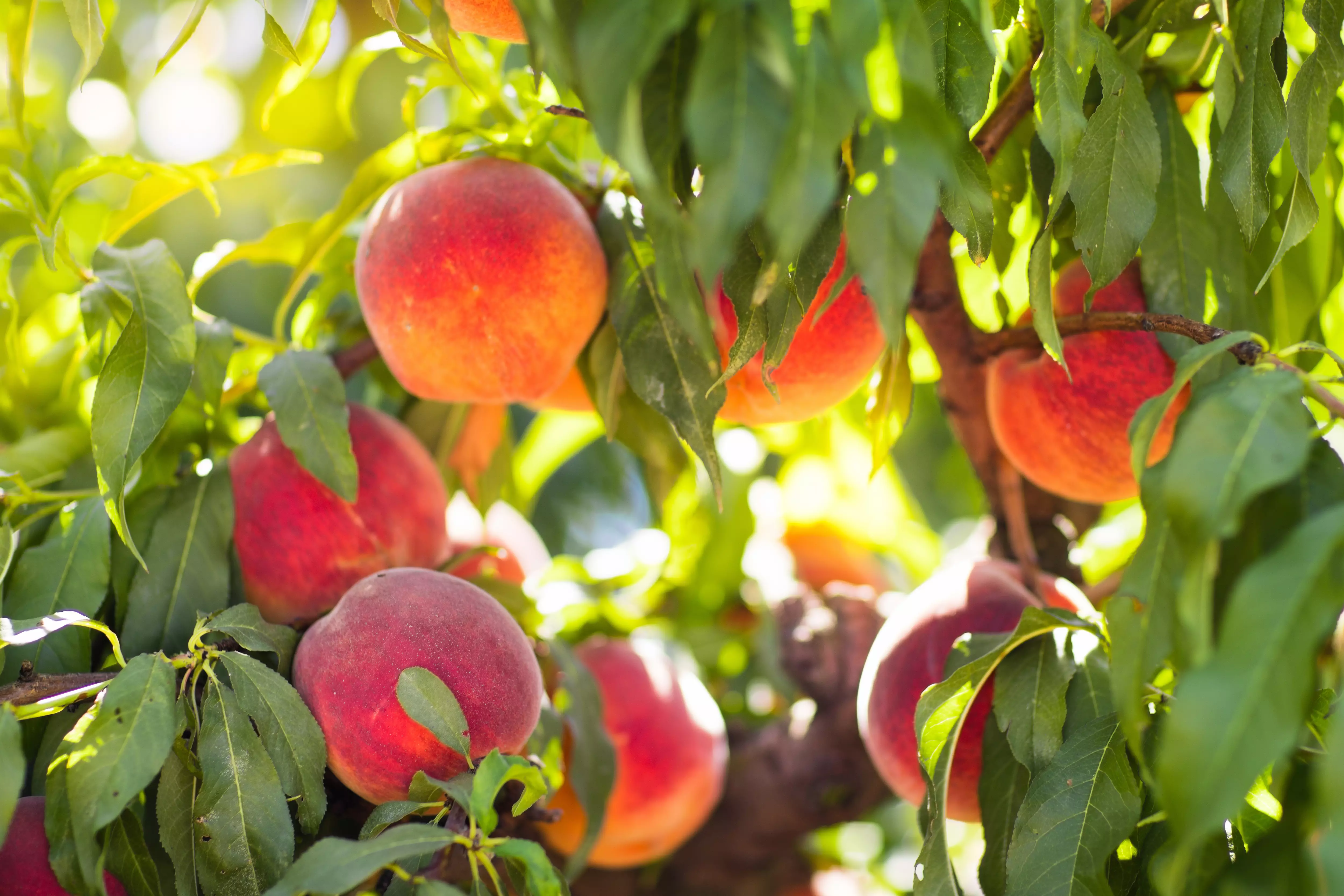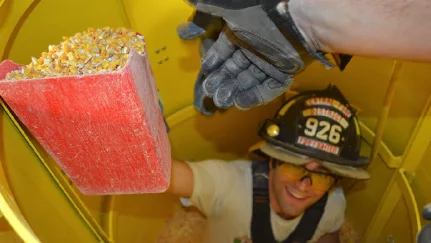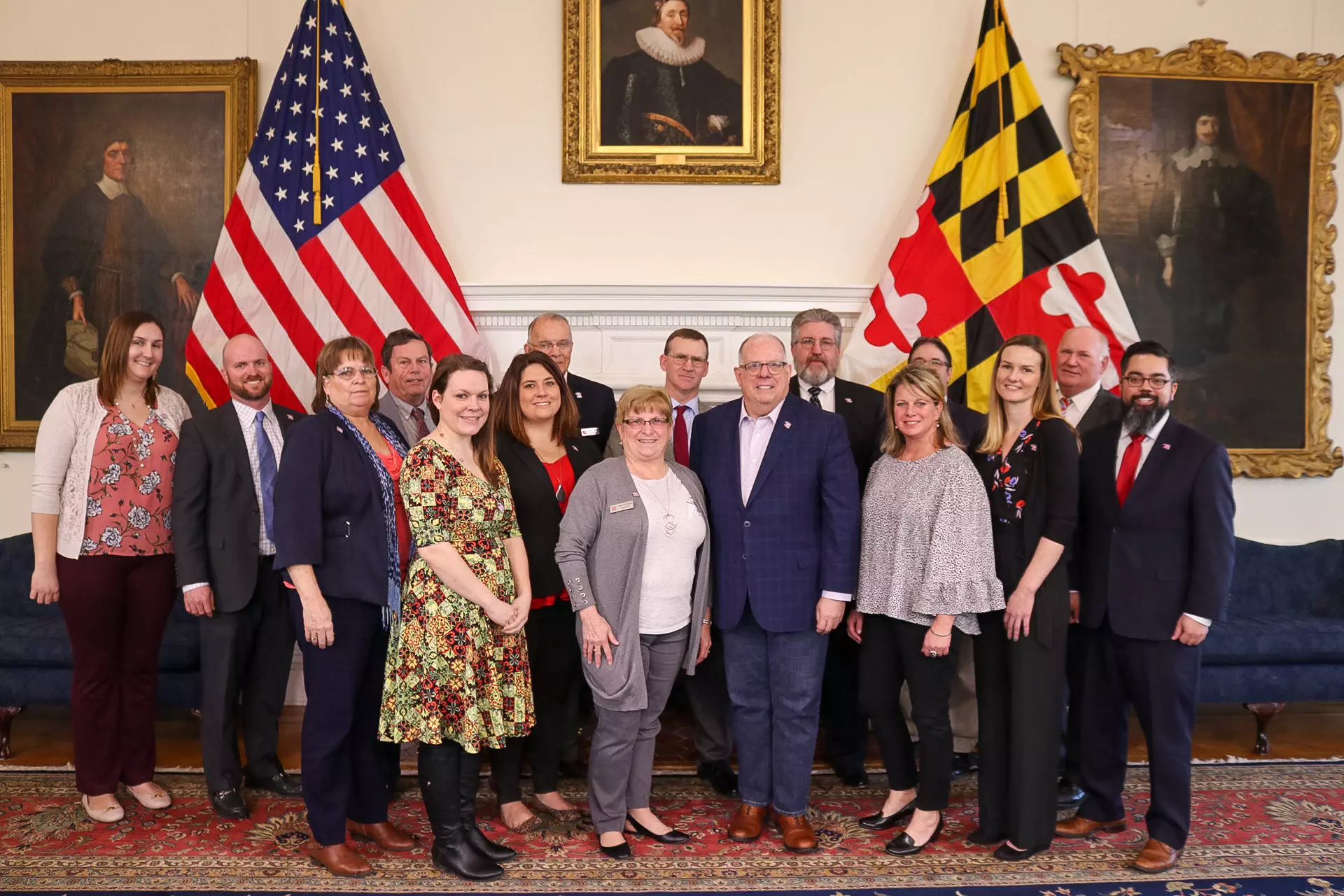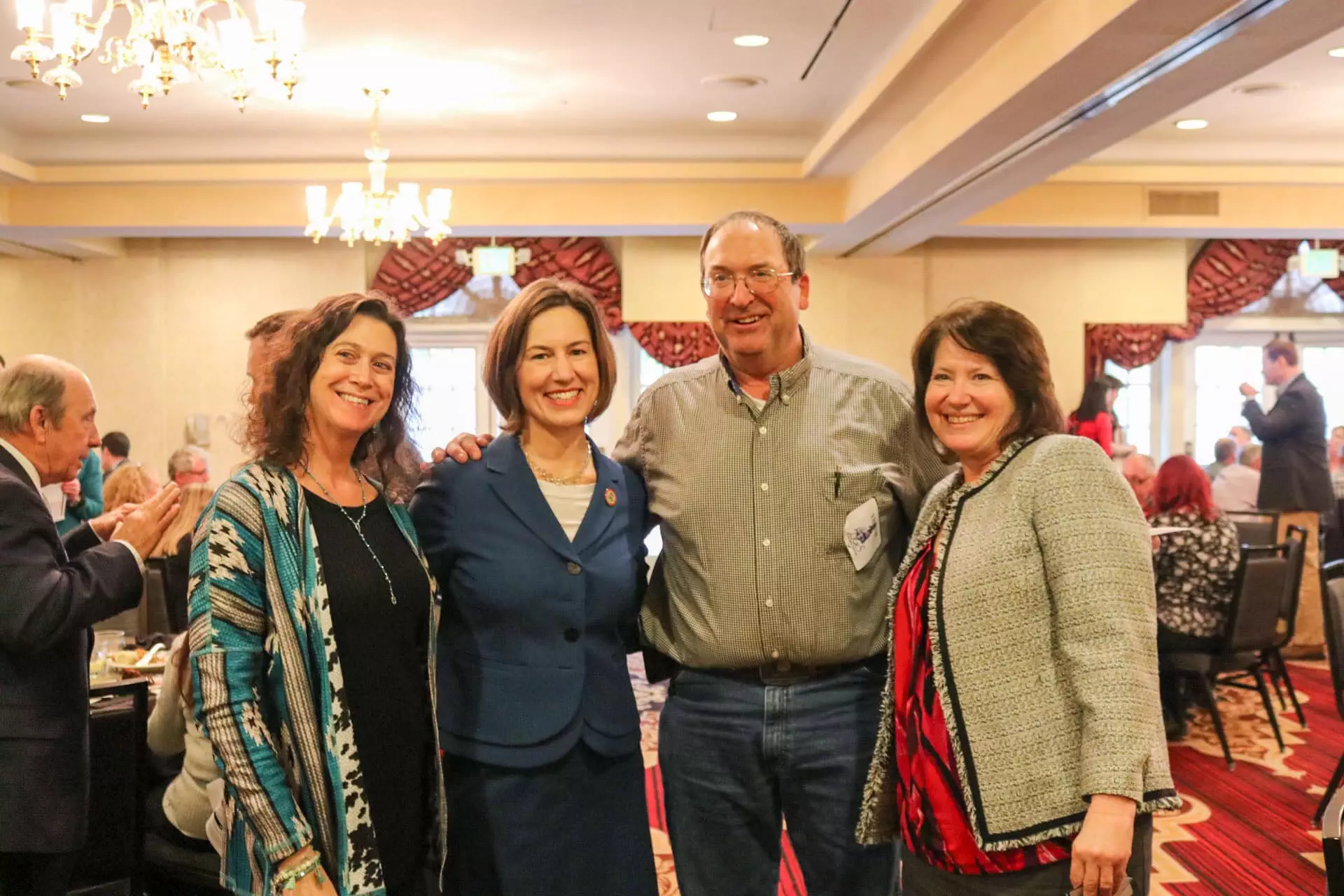December 6, 2021 – Persistence Creek Farm of Faulkner has been selected as the recipient of the inaugural Maryland Leopold Conservation Award®.
Kevin and Lauren Warring’s Persistence Creek Farm is a grain, seafood and timber business in Charles County. The Warrings were presented with the $10,000 award at the Maryland Farm Bureau’s Annual Convention in Cambridge on December 6.
Given in honor of renowned conservationist Aldo Leopold, Sand County Foundation and national sponsor American Farmland Trust present the Leopold Conservation Award to farmers, ranchers, and forestland owners in 23 states for land, water, and wildlife habitat management. In Maryland, the award is presented with Keith Campbell Foundation for the Environment, Maryland Association of Conservation Districts, and Maryland Farm Bureau Inc.
“The diversity of conservation and production practices on the Warrings’ farm elevates the sustainability conversation,” said John Torres, Maryland Farm Bureau Executive Director. “Not only are they protecting the land and waterways, but with the various things they produce (grain, seafood and timber), it harkens back to a time when many had to produce whatever they needed to sustain themselves. The Warrings, who we are proud to call longtime members, are helping to meet the needs of themselves and others, all while protecting our vital natural resources for future generations to do the same.”
“The management decisions farmers make daily not only impact our food supply, but our environment,” said Samantha Campbell, Campbell Foundation President. “Farmers are essential partners who are too often not commended for the stewardship they provide. We are very pleased to present this award to the Warring family in recognition of their leadership in both agricultural production and advancing practices that benefit the natural world.”
“The Warring family has an admirable legacy of stewardship,” said Bruce Yerkes, Maryland Association of Soil Conservation Districts President. “MASCD joins our partner organizations in recognizing all of the conservation efforts on their farm, as well as their important voice in sharing their story through farm tours and media outlets.”
“Recipients of this award are real life examples of conservation-minded agriculture,” said Kevin McAleese, Sand County Foundation President and Chief Executive Officer. “These hard-working families are essential to our environment, food system and rural economy.”
“As the national sponsor for Sand County Foundation’s Leopold Conservation Award, American Farmland Trust celebrates the hard work and dedication of the Persistence Creek Farm,” said John Piotti, AFT President and CEO. “At AFT we believe that conservation in agriculture requires a focus on the land, the practices and the people and this award recognizes the integral role of all three.”
Earlier this year, Maryland landowners were encouraged to apply (or be nominated) for the award. Applications were reviewed by an independent panel of agricultural and conservation leaders. Among the outstanding Maryland landowners nominated for the award were finalists Ordinary Point Farm of Earleville in Cecil County, Persimmon Tree Farm of Westminster in Carroll County, and Rich Levels Grain, Inc., in Cecil and Kent counties.
The Leopold Conservation Award is given to farmers, ranchers and forestland owners across the U.S. in honor of renowned conservationist Aldo Leopold. In his influential 1949 book, A Sand County Almanac, Leopold called for an ethical relationship between people and the land they own and manage.
The Maryland Leopold Conservation Award is made possible through the generous support of American Farmland Trust, Keith Campbell Foundation for the Environment, Maryland Association of Conservation Districts, Maryland Farm Bureau, Inc., Sand County Foundation, Maryland Department of Agriculture, Farm Credit, USDA Natural Resources Conservation Service, Delmarva Chicken Association, Alliance for the Chesapeake Bay, Chesapeake Conservancy, Eastern Shore Land Conservancy, ShoreRivers, and The Nature Conservancy.
ABOUT PERSISTENCE CREEK FARM
When Kevin and Lauren Warring bought their farm in 2009, they set out to leave it better than they found it. Their Persistence Creek Farm has become a confluence of how farming, fishing and forestry businesses can benefit natural resources.
Healthier soil leads to higher crop yields. Cleaner water leads to higher crab and oyster populations. Agricultural conservation practices are good for the bottom line and natural resources.
The Warrings take soil seriously. They annually rotate crops of corn, soybean and sorghum to sustain soil fertility. They use no-till or minimum tillage on all fields to reduce run-off. Cover crops are planted on all fields to protect soil microorganisms. Nutrient management plans and annual soil tests minimize fertilizer inputs, and maximize yields by tailoring a crop’s nutrient needs.
To enhance wildlife habitat and maintain productive forests, the Warrings have utilized financial assistance from the federal Conservation Stewardship Program, and technical guidance from a forester from the Maryland Department of Natural Resources. By following a custom forestry plan, thinning acres of forestland has increased timber growth rates for future harvests, while boosting biodiversity and providing wildlife with food and cover.
Acres of shrubs, maple, pine and oak trees have been planted to reduce streambank erosion. Riparian herbaceous buffers that stretch 50 feet on each side of Ross Branch stream, capture nutrients from crop fields, improve water quality, and provide nesting habitat for wildlife.
Two acres of ponds and wetlands provide habitat for frogs, ducks and deer. Food plots of white clover, sunflowers, corn, and soybeans are planted annually. A self-described “flower geek,” Kevin has planted five acres of wildflowers and native grasses in prairie strips to attract Monarch butterflies and other insect pollinators.
A stream-crossing project involved re-sloping banks and installing concrete footers and riprap to reduce erosion. The long-term health of the Potomac and Wicomico rivers has been improved by the more than 100 million spat on shell (baby oysters) the Warrings have helped plant since 2014.
Kevin and his father Francis are both active members of the Charles County Waterman’s Association, which provides public and legislative outreach on fishery regulations. Both have served as associate supervisors for the Charles Soil Conservation District. Kevin’s parents Francis and Joyce have their own farm just 10 miles from Persistence Creek Farm.
Persistence Creek Farm’s enrollment into a perpetual conservation easement permanently preserves its future use for agriculture and forestry, and limits housing or mining development.
Kevin, who has degrees in physics and economics, helped re-establish an FFA chapter in Charles County. The active Farm Bureau member has hosted farm tours for schools and legislators, and appeared on a national conservation-themed podcast.
Kevin also serves as a guide for youth hunting deer, turkey and waterfowl. He shows these hunters and their parents how conservation practices benefit wildlife.
Like Aldo Leopold before him, Kevin teaches others that wildlife is a natural resource that must be managed to ensure its long-term sustainability. He’s also a believer in the inherent land ethic that Leopold first wrote about.
Kevin says the day he and Lauren signed the farm’s deed was a dream come true. Yet he’s quick to note they are just temporary caretakers. He says visible reminders of this are the arrowheads their children frequently find buried across the fields of Persistence Creek Farm.
# # #
LEOPOLD CONSERVATION AWARD PROGRAM
The Leopold Conservation Award is a competitive award that recognizes landowner achievement in voluntary conservation. Sand County Foundation presents the award in California, Colorado, Kansas, Kentucky, Maryland, Missouri, Montana, Nebraska, New Mexico, New York, North Dakota, Oklahoma, Pennsylvania, South Dakota, Texas, Utah, Wisconsin, and in New England (Connecticut, Maine, Massachusetts, New Hampshire, Rhode Island and Vermont). www.leopoldconservationaward.org
SAND COUNTY FOUNDATION
Sand County Foundation inspires and empowers a growing number of private landowners to ethically manage natural resources in their care, so future generations have clean and abundant water, healthy soil to support agriculture and forestry, plentiful habitat for wildlife and opportunities for outdoor recreation. www.sandcountyfoundation.org
AMERICAN FARMLAND TRUST
American Farmland Trust is the only national organization that takes a holistic approach to agriculture, focusing on the land itself, the agricultural practices used on that land, and the farmers and ranchers who do the work. AFT launched the conservation agriculture movement and continues to raise public awareness through its No Farms, No Food message. Since its founding in 1980, AFT has helped permanently protect over 6.5 million acres of agricultural lands, advanced environmentally sound farming practices on millions of additional acres, and supported thousands of farm families. www.farmland.org
THE KEITH CAMPBELL FOUNDATION FOR THE ENVIRONMENT
The Keith Campbell Foundation for the Environment’s mission in the Chesapeake Bay Region is to improve water quality and ecological balance in the Bay and its rivers, as a healthy bay fosters a vibrant regional economy and provides exceptional recreational opportunities and a better quality of life. The Foundation provides approximately $7 million in funding through more than 150 grants annually, and has been funding in the region since 1998. www.campbellfoundation.org
MARYLAND FARM BUREAU®, INC. is a 501(c)(5) federation that serves as the united voice of Maryland farm families. Our organizational strength comes from the active participation of over 12,000 individual and family members who belong to the state’s 23 local county Farm Bureau organizations. Since 1915, Maryland Farm Bureau has been committed to protecting and growing agriculture and preserving rural life. Maryland Farm Bureau is a proud member of the American Farm Bureau® Federation. www.mdfarmbureau.com
MARYLAND ASSOCIATION OF SOIL CONSERVATION DISTRICTS serves as the voice of Maryland’s 24 soil and water conservation districts on state legislative issues. It also provides a forum for training, policy-making and the exchange of information at their annual and quarterly gatherings. Its mission is to promote practical and effective soil, water, and related natural resources programs to all citizens through individual conservation districts on a voluntary bases through leadership, education, cooperation and local direction. www.mascd.net







